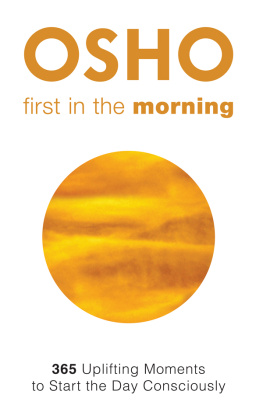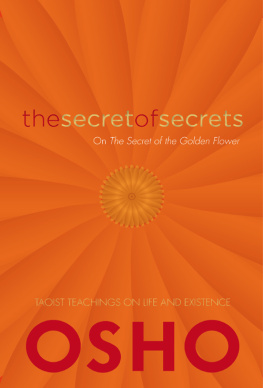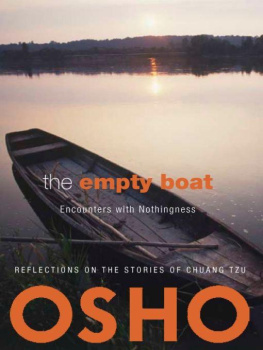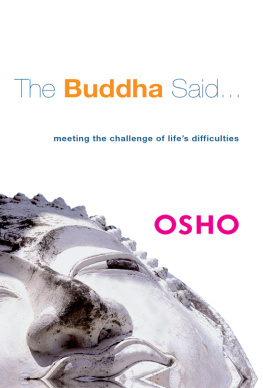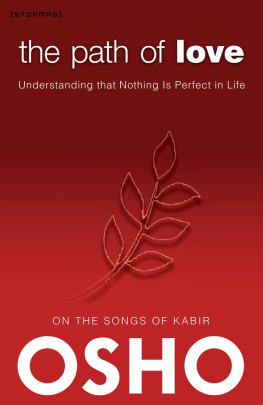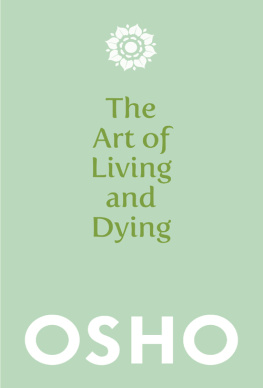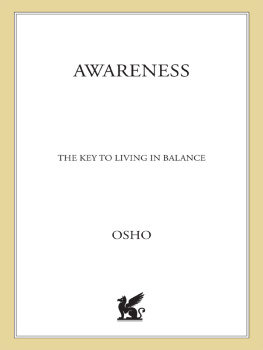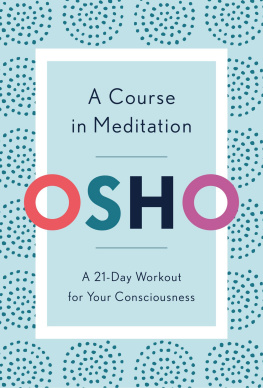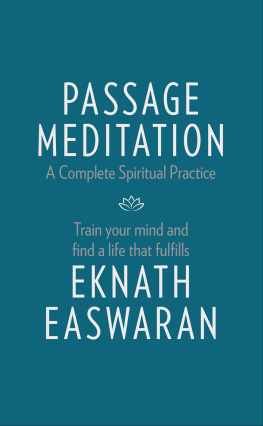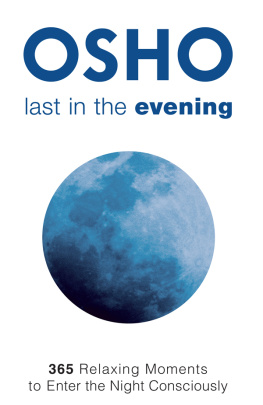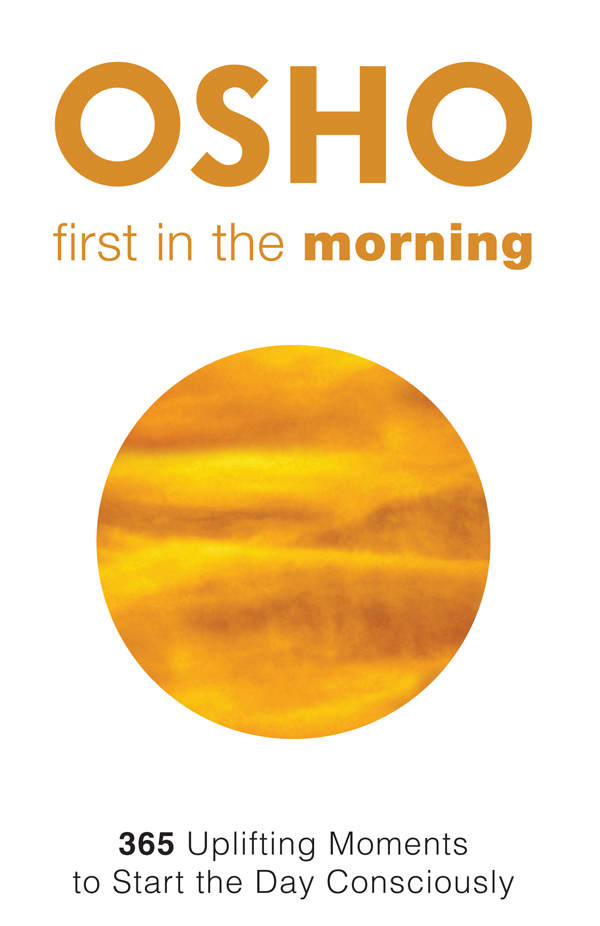First in the Morning
Uplifting Moments to Start the Day Consciously

ISBN: 978-0-88050-619-9
Copyright 1991, 2015 OSHO International Foundation
www.osho.com/copyrights
Images and cover design OSHO International Foundation
All rights reserved. No part of this book may be reproduced or transmitted in any form or by any means, electronic or mechanical, including photocopying, recording, or by any information storage and retrieval system, without prior written permission from the publisher.
First in the Morning is also available as a print edition ISBN 978-1-938755-82-8
Previously published as A Must for Morning Contemplation
The text excerpts in this book are selected from various talks by Osho, given to a live audience. All of Osho's talks have been published in full as books, and are also available as original audio recordings. Audio recordings and the complete OSHO text archive can be found via the online OSHO Library at
www.osho.com/library
OSHO is a registered trademark of OSHO International Foundation
www.osho.com/trademarks
OSHO MEDIA INTERNATIONAL
www.osho.com/oshointernational
Library of Congress Catalog-In-Publication Data is available
ISBN 978-0-88050-619-9
Introduction
The words on the following pages are extracted from intimatemeetings, where the contemporary mystic, Osho, talks with people from all walksof life. It was at Osho's suggestion that this, and its companion volume, Lastin the Evening, were compiled. The books have been planned in such a waythat each day has a particular theme, and the subject of the morning andevening complement each other. So First in the Morning can be readalone, or in combination with the evening book.
The best time to read the passage for the morning is to do so onfirst waking up, before the mind becomes engaged in the days activities. Thebook contains 365 passages, which have been designed to be readchronologically, rather than randomly.
In this book, Osho sometimes refers to sannyas or sannyasins.As Osho uses this term, sannyas simply means making a decision to bringself-awareness into your life, a commitment to give time to the exploration andcelebration of the inner, as well as to the outer, ordinary, day-to-dayconcerns: Sannyas is nothing but the change, the shift, the radical shift,from looking at oneself from the outside to looking at oneself from the inside.It is sitting inside and looking, not depending on others opinions,scriptures, et cetera, but just watching yourself from your innermost core andasking, Who am I? And not depending on anybody elses answer. One has to findones own answer, only that can be fulfilling.
Reading the passages in this book is in itself a form ofcontemplation because, as Osho says, the words of a mystic are not part of anytheory to be accepted or refuted; the reader is not asked to be a follower or abeliever. In fact, it is not even the words themselves that are ofsignificance, but rather what the words convey.
[The mystic's] words carry a silence around them, his wordsare not noisy. His words have a melody, a rhythm, a music, and at the very coreof his words is utter silence. If you can penetrate his words you will comeacross infinite silence.
"But to penetrate the words of a buddha, the way is notanalysis, the way is not argument, the way is not discussing. The way isfalling in rapport with him, becoming attuned with him, being in synchronicitywith him In that attunement, in that at-onement, one enters the very core ofthe master's words. And there you will not find any sound, any noise; there youwill find absolute silence. And to taste it is to understand the master.
"The meaning of the word is not important, remember, butthe silence of the word."
Osho,
The Dhammapada: The Way of the Buddha,Vol. 3
Day 1
Man is not meant to crawl and creep on the earth. He has thecapacity to fly to the ultimate.
Day 2
Each age needs a new kind of spirituality because each age isdifferent from any other; hence messengers keep on coming. A messenger isnothing but a man who translates the eternal truth for contemporary man.
Day 3
Modern man is the first man in history to have no idea ofsacredness, to be living a very mundane life. He is interested in money, power,prestige, and he thinks that is all there is. It is such a stupid notion.
His life is surrounded by small things, very small. He has noidea of anything bigger than himself. He has denied God, he has said that Godis dead. He has denied life after death, he has denied life within. He believesonly in denying the center. He believes only in the superficial; he believes inthe circumference, but goes on denying the center, hence we see such boredomall around. It is natural because without something bigger than you to relateto, your life is going to be tedious, boring. A life becomes a dance only whenit is an adventure. And it can become an adventure only when there is somethinghigher than you to achieve, to reach.
The sacred simply means that we are not the end, that we are onlya passage; that everything has not already happened, that much has yet to happen.The seed has yet to sprout and the sprout to become a tree. That tree has towait for spring and to explode into thousands of flowers, releasing its soulinto the cosmos. Only then will there be fulfillment. And the sacred is not faraway; we just have to start asking about it. In the beginning, of course, weare groping in the dark, but soon things start falling in tune. Soon we starthaving glimpses of the beyond, an unheard music starts to reach our hearts: itstirs our being, it gives us new color, new joy, a new life.
Day 4
We are not strangers, outsiders. We are part of existence. Thisis our home. We are not here accidentally; we are here because we are needed.We are here because existence wanted us to be here in the first place. It isthe will of existence. Hence nobody need feel alienated. That is one of themost fundamental problems that humanity is facing today. All over the worldintelligent people are very worried, disturbed, anxious, asking: Why are wehere?
According to science, it seems accidental that we are here, andif we are accidental then we are useless; then whether we are, or are not,makes no difference. If it makes no difference, then our life loses allmeaning: hence all over the world there is a climate of meaninglessness. It allstarted a hundred years ago with the declaration by Nietzsche that God is dead.He became the mouthpiece of the whole contemporary mind.
If God is dead, then life is meaningless because God is the onlypossibility of there being any meaning, any significance.God simplymeans nothing but meaning. Life is meaningful thats the whole meaning of God.
Day 5
We have not lost anything. God is not lost and hence has not tobe found. We have only forgotten; it is just a question of remembrance. It isthere in the deepest core of our being. Call it truth, God, bliss, beauty: allthose things indicate the same phenomenon. There is something eternal in ourbeings, something immortal, something divine.
All that we have to do is to go deep, dive deep, into our ownbeing, and to see, realize, recognize. Hence the journey is not really ajourney. We are not to go anywhere; we have simply to sit silently and be.
Day 6
The moment you are empty of yourself, you are full of God. Bothcannot exist together, remember. Remember again and again: both cannot existtogether: it is either you or God. And it is the foolish person who chooseshimself. Choose God: disappear as an ego. Forget yourself as an entity separatefrom existence, and in that very disappearance you are reborn.

